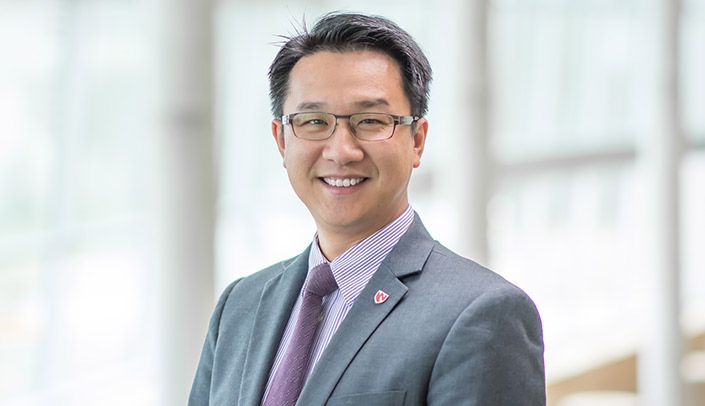Ka-Chun (Joseph) Siu, Ph.D., is one of the recipients of the Office of Academic Affairs’ 2019-20 Impact in Education Awards. He will receive the Research in Education Scholar Award.
- Name: Ka-Chun (Joseph) Siu, Ph.D.
- Title: Associate professor and director of Global Health Opportunities Program, UNMC Department of Physical Therapy Education, College of Allied Health Professions
- Joined UNMC: 2009
- Hometown: Hong Kong
Research in Education Scholar Award
This award recognizes an individual who has advanced the educational literature through peer-reviewed publications, educational grants and original research.
You are the recipient of the Research in Education Scholar Award. What is the importance of research in health care education?
Research is to search or investigate for a subject or an unknown in order to discover new information or reach a new conclusion. The process is repeated and infinite, which makes research exciting and breathtaking. I believe research plays an imperative role to advance health care education. Searching new methods or platforms makes education more creative and innovative. The emerging simulation technology at our Dr. Edwin G. & Dorothy Balbach Davis Global Center is a great example to leverage interprofessional experience and research for enduring learning. As educators, we should keep searching or looking for new ideas to strive for excellence in our health care education.
Describe your proudest moment as an educator.
Seeing the success of our students reflects the value of education and being an educator. Every year, many health professional students and graduate students successfully graduated from their respective programs at UNMC. I am always honored and proud of joining their commencement ceremonies and serving as their academic adviser or program representative to place their academic hoods over their shoulders. In such moments, we are not just signifying our students’ success in completing their academic programs, but also giving them the important responsibilities to properly deliver and share the knowledge that they learned from us to others.
What advice would you give other faculty members who want to have an impact in education?
Understanding how to use learning theory to promote the fitting learning behavior is fundamental. For example, based on the Kolb’s Learning Inventory, “Doing” and “Watching” forms a continuum to the learning process, whereas “Feeling” and “Thinking” creates a continuum of learning perception. This helps us as educators to strategically deliver education materials based on the needs of our health professional students and graduate students. As the technology advances in medical education, it is critical to explore innovative approaches (e.g. simulation) to tailor individual learning experience and accelerate the learning process. As an innovative and creative educator, we should continue to learn and try to use new technology to make an impact in education. The possibility for using innovative technology in health care education is unlimited.
Do you have a favorite quote or philosophy on teaching?
I don’t have a favorite quote, but I believe in teaching to make a long-term impact on individual life. Teaching is not only to instruct and to inform, but also to listen and to observe, with an ultimate goal of making a profound influence on an individual.

Congratulations, Joseph!!!
Congratulations! You are so deserving of this honor!
Very pleased for you, Joseph!